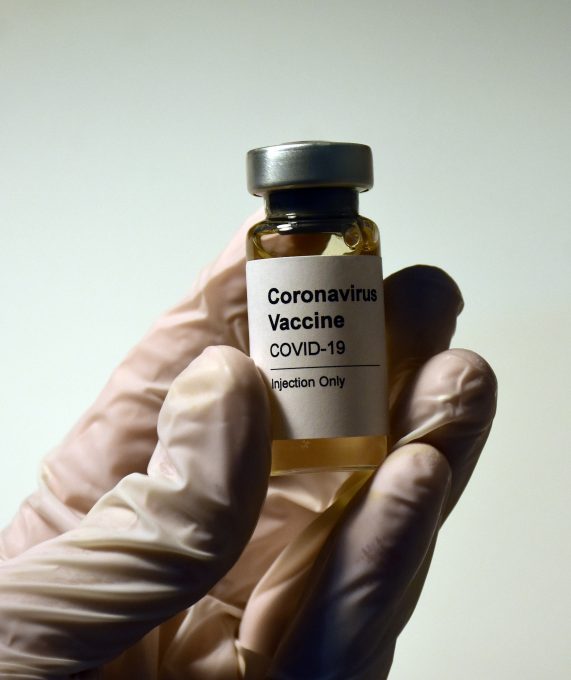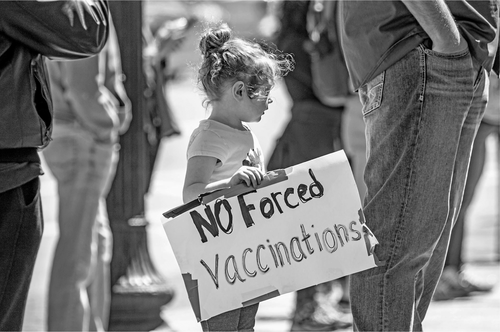The coming vaccine battle

The past several months have provided a peek into a future where a COVID vaccine is made and produced, and when a small but animated minority refuses the vaccine, claiming personal or religious freedom or ongoing denial of the seriousness of the virus. In some cases, coordinated protests around the country have shown citizens holding signs insisting their freedoms have been violated by social distancing orders aimed at containing the current COVID-19 pandemic. In other cases, individuals have challenged requests that they wear masks to protect others around them. Though small, they signal what is likely to come as communities grapple with how to move forward, particularly if a vaccine against SARS-CoV-2, the virus causing the pandemic, becomes available. Despite broad enthusiasm for a hypothetical vaccine, we will have to face hard questions of what to do with those who do not want it. For more than a decade, I have been studying vaccine refusal and the ways individual rights and community responsibilities are bound together and are sometimes in conflict. Now, as we face new questions about the COVID-19 pandemic and state responses, these issues are of critical importance.
Outside of the military, the U.S. does not have any rules to mandate vaccination, and what laws do exist are enforced at the state or local level. All states require childhood vaccines as a condition for accessing schools or childcare settings, though states allow exemptions for medical reasons and sometimes non-medical ones. Although a range of vaccines for adults are available, they are typically encouraged, not mandated. The exception is for those who work (or are training) in healthcare, since they typically face greater risk of becoming infected and spreading infection, particularly to those who might be most vulnerable to the worst outcomes of infection.
Childhood vaccines are recorded in state-run vaccine registries. These databases merge records from multiple health providers and allow families to more easily access their children’s vaccine records when needed. Registries also help states and local governments identify where pockets with low immunity exist and to act quickly to contain outbreaks. Although these systems are secure and allow individuals to opt-out, they nonetheless raise concerns about what parents I spoke with referenced as “womb to tomb tracking.”
Even in places where parents are legally entitled to opt-out of vaccines, states have the power during a disease outbreak to quarantine or otherwise limit freedoms of the unvaccinated. This right was affirmed in 1 905 when the U.S. Supreme Court heard a challenge to a law that required residents to be vaccinated against smallpox or to pay a fine. The court ruled in that case, Jacobson v MA, that governments are entitled to limit individual freedoms for the good of the community, arguing that, “Society based on the rule that each one is a law unto himself would soon be confronted with disorder and anarchy. Real liberty for all could not exist under the operation of a principle which recognizes the right of each individual person to use his own… person or property, regardless of the injury that may be done to other.”

State powers are not absolute. Public agents must demonstrate necessity and cannot exercise power in “an arbitrary, unreasonable manner” or go “beyond what was reasonably required for the safety of the public.” There must be a clear relationship between the intervention and the legitimate public health goal it seeks to accomplish.
Since this 1905 decision, we have seen challenges to these state powers, which inform our current and future responses to COVID-19. In 2019, with measles outbreaks around the country, many cities worked to immunize those who were unvaccinated and enacted quarantines for those who refused. Rockland County, NY, for example, restricted the movement of people who lived in areas with high rates of infection, barring them from school until a threshold level of immunity was reached and blocking unvaccinated children from gatherings of more than ten people. New York City went further and identified four Brooklyn zip codes with high rates of unimmu-nized children and measles infections and ordered anyone over six months of age who lived, worked, or attended school there to be immunized or face a fine.
When it comes to children, there is a strong consensus on vaccines. Some advocates insist that access to vaccines is a core human right consistent with the United Nations Convention on the Rights of the Child, which promises children “special protection,” and opportunities to “develop physically, morally, spiritually and socially in a healthy and normal manner.” (Those who oppose vaccines make the same assertion.) These issues are more complicated with adults, since adults’ rights to refuse healthcare, even when life-sustaining, are well established and generally accepted.
Any vaccine to prevent COVID will have to face these issues. Should one prove safe and effective after rigorous testing, it is unlikely there will be adequate supply to meet demand, even as fewer than half of Americans in surveys in September 2020 said they want it. When the polio vaccine was first licensed, there was more demand than supply and arguments ensued over whether it should be first given to those who could pay for it or to those at greatest risk, and who should decide. The response to one of the last outbreaks of smallpox—New York in 1947—also suffered from inadequate supply.
Recent vaccine shortages have forced decisions on how best to ration them. New questions with a COVID vaccine will emerge. Should priority go to older people who are most likely to be hospitalized or die if infected? Should vaccines go to essential workers first, and if so, which workers are essential? How should the vaccine be priced, particularly since so much public funding has gone to developing the vaccine? How priorities are set, and by whom, will matter in building trust in vaccine distribution systems.
The harder questions are what to do with those who don’t want a vaccine. We already face challenges in finding ways to contain infection as cities, businesses, and travel systems reopen. Arguments about a containment strategy less invasive than a vaccine, like whether to require a mask in stores or on flights, suggest this may be difficult to solve. Questions about how to handle vaccine refusal will become increasingly significant, particularly if evidence of immunity becomes required for participation in civil society. We must ask, what limitations should be reasonably placed on adults who don’t want the vaccine and don’t have immunity from infection? State law may drive policies on this, but corporations and private entities may also be able to make immunization a condition of employment or service. For example, one could imagine companies making proof of immunity a condition for attending concerts or sporting events, traveling, or working in jobs with high levels of public contact.
During other outbreaks, employees in particular industries are often required to show evidence of vaccination or immunity to continue working. For example, hospitals typically require workers who refuse flu vaccines to wear masks and stickers on their badges to denote their unimmunized status or simply terminate their employment. Based on the precedent set in the historic case of smallpox, states would likely be able to require COVID immunizations or exclude individuals without immunity from some kinds of work. States could also force unimmunized workers to take heavy precautions to prevent them from infecting others, so long as scientific consensus exists. Yet, the state’s ability to “keep in view the welfare, comfort and safety of the many, and not permit the interests of the many to be subordinated to the wishes or convenience of the few,” as the Jacobson decision suggests, will not be easy. Monitoring the private sector and ensuring employers consider medical or religious reasons that might prevent someone from being immunized while also protecting privacy, for example, will likely prove difficult.
In the past six months, groups have condemned imagined future efforts to require vaccines, to track immunization records, or to make employment decisions based on vaccine status. In Colorado, one resolution called on the Colorado Republican Party to affirm “the rights of citizens to live free of tracking and discrimination (medical tyranny).” Texans passed a resolution insisting that “healthcare decisions, including routine preventative care such as immunizations, should be between a patient and healthcare professional and should be protected from government intrusion.” Other states, including Wyoming and New Jersey, have organized efforts to limit vaccine usage or mandates. These recent resolutions, actions, and protests suggest that states’ ability to place community safety above individual preference will likely be challenging and challenged.
Prior to COVID-19, we faced a social landscape marred by disputes over what constitutes fact, knowledge, authority, and the appropriate role of the state. COVID-19 did not create these disputes, but magnified them. The success of any public health intervention will rest on the public’s perceptions of the reasonableness of the proposed interventions. That may not be forthcoming.
Vaccines are an important tool in promoting public health and have saved lives. Nonetheless, questioning state power remains important. In addition to controlling disease, the Jacobson decision was cited in 1927 to defend state-ordered sterilization to purportedly protect the “health of the patient and the welfare of society” by preventing the state from being “swamped with incompetence.” As recently as Spring 2020, the fifth U.S. Circuit Court of Appeals used the case to validate Texas’s order to stop physicians from performing abortions during the COVID-19 pandemic.
Balancing individual rights and community interests is complex and requires thoughtful policymakers and clear communication. The public also has a role to play in ensuring that state power is not used against those who are already vulnerable. This might indeed result in more protests but also essential conversations on how states can account for their efforts to protect everyone in the community.

Comments 1
angela angie
March 8, 2021Wonderful post
really nice
i enjoyed this